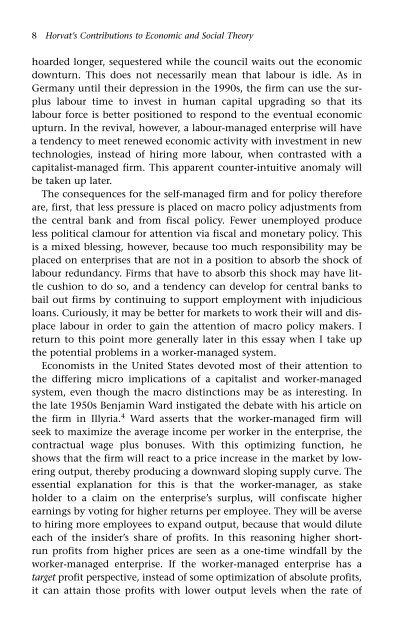Equality, Participation, Transition: Essays in Honour of Branko Horvat
Equality, Participation, Transition: Essays in Honour of Branko Horvat
Equality, Participation, Transition: Essays in Honour of Branko Horvat
Create successful ePaper yourself
Turn your PDF publications into a flip-book with our unique Google optimized e-Paper software.
8 <strong>Horvat</strong>’s Contributions to Economic and Social Theory<br />
hoarded longer, sequestered while the council waits out the economic<br />
downturn. This does not necessarily mean that labour is idle. As <strong>in</strong><br />
Germany until their depression <strong>in</strong> the 1990s, the firm can use the surplus<br />
labour time to <strong>in</strong>vest <strong>in</strong> human capital upgrad<strong>in</strong>g so that its<br />
labour force is better positioned to respond to the eventual economic<br />
upturn. In the revival, however, a labour-managed enterprise will have<br />
a tendency to meet renewed economic activity with <strong>in</strong>vestment <strong>in</strong> new<br />
technologies, <strong>in</strong>stead <strong>of</strong> hir<strong>in</strong>g more labour, when contrasted with a<br />
capitalist-managed firm. This apparent counter-<strong>in</strong>tuitive anomaly will<br />
be taken up later.<br />
The consequences for the self-managed firm and for policy therefore<br />
are, first, that less pressure is placed on macro policy adjustments from<br />
the central bank and from fiscal policy. Fewer unemployed produce<br />
less political clamour for attention via fiscal and monetary policy. This<br />
is a mixed bless<strong>in</strong>g, however, because too much responsibility may be<br />
placed on enterprises that are not <strong>in</strong> a position to absorb the shock <strong>of</strong><br />
labour redundancy. Firms that have to absorb this shock may have little<br />
cushion to do so, and a tendency can develop for central banks to<br />
bail out firms by cont<strong>in</strong>u<strong>in</strong>g to support employment with <strong>in</strong>judicious<br />
loans. Curiously, it may be better for markets to work their will and displace<br />
labour <strong>in</strong> order to ga<strong>in</strong> the attention <strong>of</strong> macro policy makers. I<br />
return to this po<strong>in</strong>t more generally later <strong>in</strong> this essay when I take up<br />
the potential problems <strong>in</strong> a worker-managed system.<br />
Economists <strong>in</strong> the United States devoted most <strong>of</strong> their attention to<br />
the differ<strong>in</strong>g micro implications <strong>of</strong> a capitalist and worker-managed<br />
system, even though the macro dist<strong>in</strong>ctions may be as <strong>in</strong>terest<strong>in</strong>g. In<br />
the late 1950s Benjam<strong>in</strong> Ward <strong>in</strong>stigated the debate with his article on<br />
the firm <strong>in</strong> Illyria. 4 Ward asserts that the worker-managed firm will<br />
seek to maximize the average <strong>in</strong>come per worker <strong>in</strong> the enterprise, the<br />
contractual wage plus bonuses. With this optimiz<strong>in</strong>g function, he<br />
shows that the firm will react to a price <strong>in</strong>crease <strong>in</strong> the market by lower<strong>in</strong>g<br />
output, thereby produc<strong>in</strong>g a downward slop<strong>in</strong>g supply curve. The<br />
essential explanation for this is that the worker-manager, as stake<br />
holder to a claim on the enterprise’s surplus, will confiscate higher<br />
earn<strong>in</strong>gs by vot<strong>in</strong>g for higher returns per employee. They will be averse<br />
to hir<strong>in</strong>g more employees to expand output, because that would dilute<br />
each <strong>of</strong> the <strong>in</strong>sider’s share <strong>of</strong> pr<strong>of</strong>its. In this reason<strong>in</strong>g higher shortrun<br />
pr<strong>of</strong>its from higher prices are seen as a one-time w<strong>in</strong>dfall by the<br />
worker-managed enterprise. If the worker-managed enterprise has a<br />
target pr<strong>of</strong>it perspective, <strong>in</strong>stead <strong>of</strong> some optimization <strong>of</strong> absolute pr<strong>of</strong>its,<br />
it can atta<strong>in</strong> those pr<strong>of</strong>its with lower output levels when the rate <strong>of</strong>

















